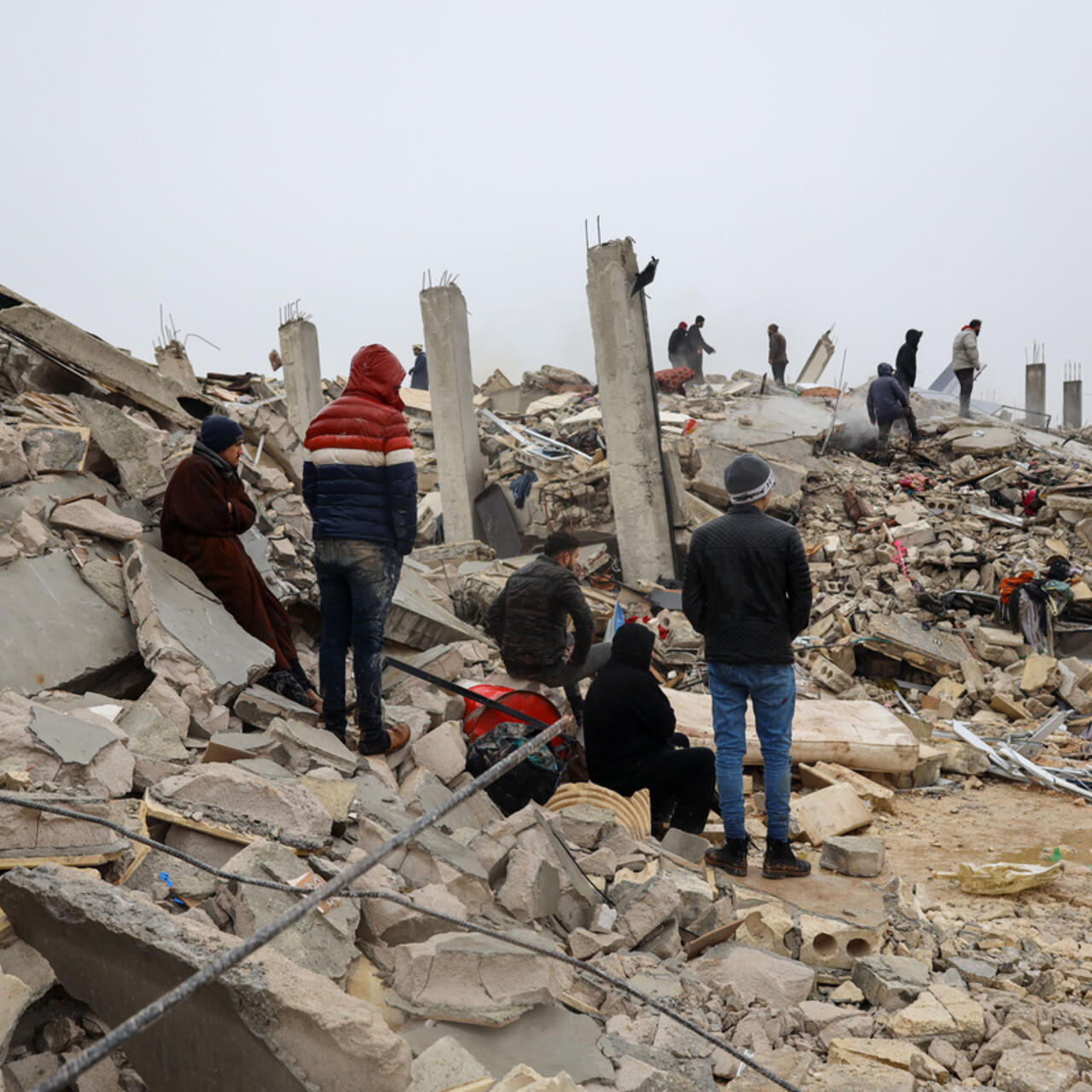
Earthquake near Turkish-Syrian border deepens crisis
In the early morning of 6 February, the most severe earthquake Türkiye had experienced in almost 100 years also sent shockwaves across northern Syria and parts of Lebanon.

In the early morning of 6 February, the most severe earthquake Türkiye had experienced in almost 100 years also sent shockwaves across northern Syria and parts of Lebanon.
In the early morning of 6 February, a severe earthquake shook southern Türkiye near the Syrian border. As first responders worked to save lives amid the devastation, hundreds of strong aftershocks followed.
Tens of thousands of people were directly impacted across Türkiye, Syria and neighbouring Lebanon. Humanitarian needs in the region, which hosts many people displaced by the 12-year conflict in Syria, were already high before these earthquakes deepened the existing crisis.
Learn more about the developing crisis and what you can do to help:
At 4:17am the first earthquake struck near the town of Gaziantep, Türkiye, located about 80 km north of the Syrian border. It may be the strongest to hit Türkiye since 1939 when a quake of the same magnitude caused 30,000 deaths.
As rescue missions were underway, hundreds of aftershocks followed, the strongest with a magnitude of 7.5. This has caused further waves of destruction, putting search and rescue workers at risk and impacting communities in southern Türkiye, northern Syria and parts of Lebanon.
The earthquake and aftershocks have damaged roads, border crossings, and critical infrastructure, severely hampering aid efforts.
This destructive earthquake has left more than 7,000 people dead and tens of thousands injured across the region. These figures are likely to increase as first responders continue to search through the rubble of homes and buildings.
At the same time, the devastation left by the quakes will exacerbate the ongoing humanitarian crises in Syria and Lebanon. Both countries feature on the International Rescue Committee’s 2023 Emergency Watchlist of the places most at risk of deteriorating humanitarian crises in the coming year.
“Anywhere else in the world, this would be an emergency,” says Mark Kaye, the IRC’s director of policy, advocacy and communications for the Middle East and North Africa.
“What we have in Syria is an emergency within an emergency.”
IRC staff responding on the ground in Syria report that the quake has affected areas that host a high number of families displaced by conflict. Many of the people impacted have already been displaced up to 20 times.
The country’s ongoing war has weakened vital infrastructure, including the health system, reducing its capacity to respond to emergencies like this one. Only 59% of hospitals in Syria are fully functional.
Electricity across the affected area remains intermittent, with many parts of northern Syria completely off the grid. This includes mobile and internet outages, making the response and coordination even more difficult.
Gas supplies, which many rely on to heat their homes, have also been severely impacted - meaning that even if people are able to return to their homes they will have to endure freezing temperatures.
Even before the quakes, 2 million people were already lacking adequate housing during the harsh Syrian winter. This includes 800,000 people - most of them children - who live in makeshift shelters without reliable access to heat, electricity, clean water or sanitation services.

“Temperatures are plummeting to below zero, leaving thousands exposed,” says Tanya Evans, the IRC’s Syria country director.
“Women and children will find themselves particularly at risk of exploitation and abuse should they find themselves once again displaced,” she explains. “Many in northwest Syria have been displaced up to 20 times and with health facilities strained beyond capacity - even before this tragedy - many did not have access to the healthcare they critically need.”
While some nations have announced plans to provide earthquake aid to Syria, the existing international humanitarian response plan for the country remains severely underfunded with less than half of the $4 billion required to meet humanitarian needs.

In Türkiye, first responders are working to rescue families from buildings destroyed by the earthquake. Strong aftershocks, including the 7.5 magnitude quake that struck the Elbistan district, have complicated the relief efforts. Countries around the world have offered their support to the emergency response.
The first earthquake was also felt in Lebanon, shaking homes for some 40 seconds. Many residents in the capital city, Beirut, evacuated over fears of collapsing buildings.
As local first responders in Türkiye, Syria and Lebanon. work to bring those injured in the quakes to safety, the European Union has mobilised urban search and rescue teams to assist Türkiye’s response, while United Nations agencies have launched their own emergency response in the region. Meanwhile, the U.S., U.K. and other countries have also sent personnel and aid to assist the emergency response efforts in Türkiye.
The IRC is calling on the international community to urgently increase critical funding to both Syria and Türkiye, to ensure that everyone affected gets the lifesaving support they need before it is too late.
In the wake of the powerful earthquake, our teams in Syria are working tirelessly to ensure the safety and wellbeing of those affected. Our more than 1,000 staff inside the country are providing lifesaving healthcare and protection services along with other emergency early recovery support.
As humanitarian needs soar, we are launching an integrated response to affected populations across both Türkiye and Syria. This will include the provision of immediate cash, basic items, such as blankets and towels, and hygiene supplies like soap, toothbrushes and feminine products. As part of our work to support essential health services in affected areas, the IRC launching two mobile health teams which will provide treatment and care to survivors. We will also set up safe spaces for affected women and children.
Please donate. Your gift will help the IRC provide emergency services to families in Türkiye and Syria, and to refugee families in countries around the world.
*Last name removed for privacy.